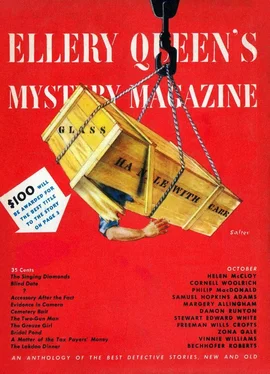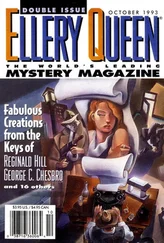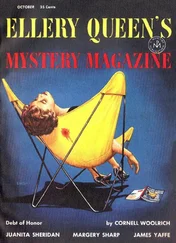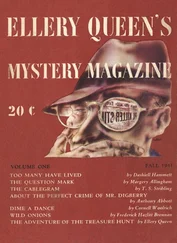Марджери Аллингем - Ellery Queen’s Mystery Magazine. Vol. 14, No. 71, October 1949
Здесь есть возможность читать онлайн «Марджери Аллингем - Ellery Queen’s Mystery Magazine. Vol. 14, No. 71, October 1949» весь текст электронной книги совершенно бесплатно (целиком полную версию без сокращений). В некоторых случаях можно слушать аудио, скачать через торрент в формате fb2 и присутствует краткое содержание. Город: New York, Год выпуска: 1949, Издательство: The American Mercury, Жанр: Классический детектив, на английском языке. Описание произведения, (предисловие) а так же отзывы посетителей доступны на портале библиотеки ЛибКат.
- Название:Ellery Queen’s Mystery Magazine. Vol. 14, No. 71, October 1949
- Автор:
- Издательство:The American Mercury
- Жанр:
- Год:1949
- Город:New York
- ISBN:нет данных
- Рейтинг книги:5 / 5. Голосов: 1
-
Избранное:Добавить в избранное
- Отзывы:
-
Ваша оценка:
- 100
- 1
- 2
- 3
- 4
- 5
Ellery Queen’s Mystery Magazine. Vol. 14, No. 71, October 1949: краткое содержание, описание и аннотация
Предлагаем к чтению аннотацию, описание, краткое содержание или предисловие (зависит от того, что написал сам автор книги «Ellery Queen’s Mystery Magazine. Vol. 14, No. 71, October 1949»). Если вы не нашли необходимую информацию о книге — напишите в комментариях, мы постараемся отыскать её.
Ellery Queen’s Mystery Magazine. Vol. 14, No. 71, October 1949 — читать онлайн бесплатно полную книгу (весь текст) целиком
Ниже представлен текст книги, разбитый по страницам. Система сохранения места последней прочитанной страницы, позволяет с удобством читать онлайн бесплатно книгу «Ellery Queen’s Mystery Magazine. Vol. 14, No. 71, October 1949», без необходимости каждый раз заново искать на чём Вы остановились. Поставьте закладку, и сможете в любой момент перейти на страницу, на которой закончили чтение.
Интервал:
Закладка:
I had a word with Tizer, who was not pleased to see me and had nothing to tell me. He is never sanguine and by this time his gloom was painful. I came away feeling nearly as sorry for him as I was for myself.
The Press was there in force and I walked down the hill with Peterson. We came on Chippy at the turning where the path divides. He was busy, as usual, and appeared to be taking a photograph of a holiday trio, two plump blondes in tight slacks with a flushed lout wriggling between them. There could be only one explanation of the performance and I was gratified, if surprised, to see he had the grace not to notice me.
“Grafters and buskers on fairgrounds call it mug-faking, I believe,” observed Peterson as we turned into the White Lion. “What does he charge them? Half a dollar? It’s an interesting comment on the price of whiskey.” Peterson has an acid little voice.
For the rest of the week the case dragged on. We had our hopes raised by several false alarms. Tizer thought he had a lead and went scampering to St. Leonards with a trail of us behind him, but the chase led nowhere. Everybody did what he could. The Cormorant tried to start a stink against the police. The tame psychiatrists wrote more articles for the Sundays. Somebody asked a question in the House and the Yard sent a second Chief Inspector down. Middle-aged women everywhere began to give themselves airs.
From our point of view it was all very dull. The weather turned cold and three of the best hotels ran out of scotch. I saw Chippy now and again but he did not worry me. He was picking up plenty of work, I gathered, and if his glazed eyes in the evenings were any guide, he appeared to find it profitable.
He had a new friend, I was interested to see. So far I have not mentioned Chippy’s friends. A natural distaste and embarrassment has prevented me from enlarging on them. It is one of his major disadvantages that he always seems to discover a local drinking companion who matches, if not exceeds, the man himself in pure unpresentableness. On this occasion he had chummed up with the fat man I had seen grinning at the scene of the crime, or if it was not he it was someone like him. God knows what he was by profession — a bookmaker’s tout perhaps, or a traveler in something unmentionable. I had nothing against him save that if I had seen but the soles of his feet through a grating, or the top of his hat from a bus, I should have known unerringly that he was a fellow for whom I should never have the slightest possible use. He had crumbs in the creases of his blue serge waistcoat, he dribbled his beer when he drank, his voice was hoarse and coarse, and the broad vacant grin never left his face.
Chippy went about with him most of the time and I was grateful for my release. I was agitating the office for my recall by the Saturday and should have left, I think, by the Sunday had I not made a sudden, startling discovery. Chippy was trying to avoid not only me but every other newspaperman in the town. At first I could not bring myself to believe it, but having ceased to hide from him I suddenly found I saw very little of him, and then that Sunday morning we met face to face on the steps of the Grand. In the normal way it would have been I who had become wooden-faced and evasive, and he who pursued me to insist on the morning snifter, but today he slunk from me and for the first time in my life I thought I saw him discomposed. I even stood looking after him as he shuffled off, his harness clumping round his shanks, but it was not until I was drinking with Peterson and one or two others some fifteen minutes later that the truth occurred to me. Someone had asked if Chippy had gone, since he had not seen him lately, while somebody else observed that he too had noticed a singular freshness in the atmosphere.
Peterson defended him at once with all that charity of his which is far more lethal than straight attack, and I stood quite still, looking at the big calendar over the bar.
Of course. I could not think why I had not realized it before. For Chippy time was growing pretty short.
I was so anxious that Peterson, whom I love like a brother and who knows me nearly as well, should not cotton to my idea that I wasted several valuable minutes in what I hope was misleading casualness before I drifted off, ostensibly to phone my wife. From that moment I hunted Chippy as he had never hunted me and it was not too easy an undertaking, since, as I have said, the place was stiff with pressmen and I was more than anxious not to raise any general hue and cry. Anything Chippy had I was willing to share, but until my wire was safely sent, not with the world.
I hunted him carefully and systematically like a peasant woman going through a shawl for a flea, and for the best part of the day I was fighting a conviction that he had vanished into air. But just before six, when I was growing desperate, I suddenly saw him, still festooned with cameras, stepping ashore from a so-called pleasure steamer which had been chugging a party round the bay for the best part of three hours. The other people looked to me like the same crowd who had tramped up to the wood behind the Kursaal the day after the body was found. The adolescent girl with the baby brother was certainly there, and so was Chippy’s buddy of the moment, the man with the smile.
From that moment I do not think I lost sight of him, or them either. Shadowing them was comparatively simple. The whole party moved, it seemed by instinct, to the nearest hostelry and from there in due course they moved to the next. So it went on throughout the whole evening, when the lights first came out yellow in the autumn haze and later when they shone white against the quickening dark.
I do not know when he first became aware that I was behind him. I think it was on the second trip up the Marine Boulevard, where the bars are so thick that no serious drinking time is lost in transit. I met his eyes once and he hesitated but did not nod. He had a dreadful group round him. The man with the smile was still there and so was a little seedy man with a cap and a watch-chain, and two plump blondes in slacks. I recognized them all and none of them, if I make myself clear. After that I could feel him trying to shake me off, but he was hampered and I was, I think, a fraction more sober than he. There must have been a bar on the boat.
After a while I realized that he was going somewhere in particular, heading somewhere definitely if obliquely, like a wasp to its nest. His red eyes wandered to the clock more and more often, I noticed, and his moves from pub to pub seemed more frequent.
Then I lost him. The party must have split. At any rate, I found myself following one of the blondes and a sailor who I felt was new to me, unless of course it was not the same blonde but another just like her. I was in the older and dirtier part of the town, and closing time, I felt with dismay, could not possibly be far off. For some time I searched in a positive panic, diving into every lighted doorway and pushing every swinging door. As far as I remember, I neglected even to drink and it may be it was that which saved me.
At any rate I came finally to a big ugly old-fashioned drinking house on a corner. It was as large and drab and inviting as a barn and in the four-ale bar, into which I first put my head, there was no one at all but a little blue-eyed seedy man wearing a flat cap and a watch-chain weighted with medals. He was sitting on a bench close to the counter, drinking a pint with the quiet absorption of one who has been doing just that for the last two hours. I glanced at him sharply but there was no way of telling if he was the same man who had been with Chippy’s party. It was not that I am unobservant, but such men exist not in hundreds but in thousands in every town on or off the coast.
Читать дальшеИнтервал:
Закладка:
Похожие книги на «Ellery Queen’s Mystery Magazine. Vol. 14, No. 71, October 1949»
Представляем Вашему вниманию похожие книги на «Ellery Queen’s Mystery Magazine. Vol. 14, No. 71, October 1949» списком для выбора. Мы отобрали схожую по названию и смыслу литературу в надежде предоставить читателям больше вариантов отыскать новые, интересные, ещё непрочитанные произведения.
Обсуждение, отзывы о книге «Ellery Queen’s Mystery Magazine. Vol. 14, No. 71, October 1949» и просто собственные мнения читателей. Оставьте ваши комментарии, напишите, что Вы думаете о произведении, его смысле или главных героях. Укажите что конкретно понравилось, а что нет, и почему Вы так считаете.












